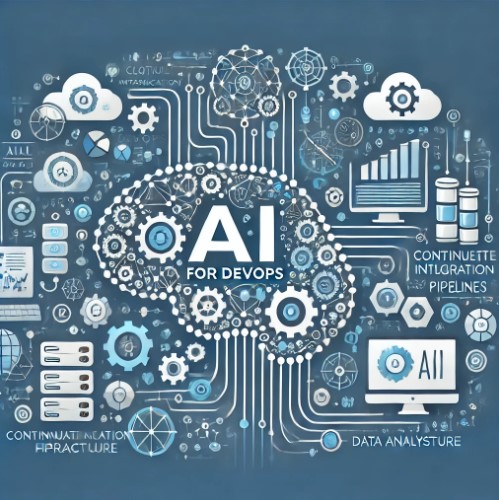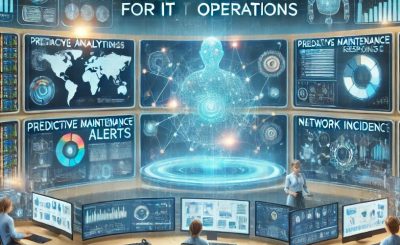Table of Contents
Introduction
The convergence of Artificial Intelligence (AI) with DevOps is transforming how organizations approach software development and IT operations. AI-driven tools streamline workflows, automate repetitive tasks, and enhance system reliability, making DevOps more efficient and agile. This article explores how AI can revolutionize DevOps, from foundational concepts to advanced applications, guiding readers on leveraging AI for continuous delivery, system monitoring, predictive analytics, and more.
What is AI for DevOps?
AI for DevOps refers to the integration of artificial intelligence technologies within DevOps practices. This integration leverages machine learning (ML) algorithms, natural language processing (NLP), and data analytics to automate, optimize, and enhance software development, testing, deployment, and monitoring processes. By adopting AI, DevOps teams can predict issues, improve code quality, and respond to incidents more proactively.
How AI Enhances DevOps Processes
1. Automation of Repetitive Tasks
AI-powered automation reduces the workload on DevOps teams by handling repetitive tasks such as:
- Code testing and bug detection
- Continuous integration and deployment (CI/CD)
- Infrastructure configuration and scaling
By automating these activities, teams can focus on strategic, value-driven initiatives instead of routine work.
2. Improved Incident Management
AI algorithms can detect anomalies in real-time, helping DevOps teams respond to incidents before they escalate. Using historical data, AI can predict when incidents are likely to occur and suggest preventive measures.
3. Enhanced Monitoring and Analytics
AI-driven monitoring tools provide continuous insights into system performance, user experience, and security metrics. These tools analyze vast amounts of data to detect patterns and alert teams to potential issues, minimizing downtime and optimizing resource allocation.
4. Predictive Analytics for Better Decision-Making
AI’s predictive capabilities empower DevOps teams to make data-driven decisions, using historical data to forecast:
- System failures and performance degradation
- Infrastructure demands and resource requirements
- Security vulnerabilities and potential breaches
Popular AI Tools for DevOps
Several AI-powered tools have emerged to streamline DevOps processes. Here are some popular choices:
- Dynatrace – Offers real-time monitoring with AI-driven insights to predict and resolve issues quickly.
- Splunk – Analyzes machine data and provides insights into operational efficiency, security, and business metrics.
- AIOps from Moogsoft – Uses machine learning for event correlation, noise reduction, and incident prediction.
- DataRobot – Enables automated machine learning model building for predicting future system performance and identifying risks.
- New Relic – Monitors application performance and integrates AI for anomaly detection and trend analysis.
Examples of AI in DevOps: Basic to Advanced
To better understand the impact of AI in DevOps, here are some real-world examples:
Basic Example: Automated Testing and Error Detection
In a traditional DevOps setup, QA teams manually test code, which can be time-consuming. AI tools like Applitools automate testing by comparing visual elements, identifying errors, and alerting developers to issues in real-time.
Intermediate Example: Predictive Scaling in Cloud Environments
AI algorithms can analyze historical data and usage patterns to forecast infrastructure demand. For instance, AWS Auto Scaling can automatically adjust resource allocation based on AI-driven predictions, ensuring consistent performance without overprovisioning.
Advanced Example: Incident Response with Natural Language Processing (NLP)
By using NLP, AI can analyze past incident reports and recommend solutions for current issues. Tools like IBM Watson AIOps apply NLP to process historical logs, identify patterns, and provide solutions, reducing response time for recurring incidents.
Challenges in Implementing AI for DevOps
Despite its potential, incorporating AI into DevOps presents challenges:
- Data Privacy and Security: Leveraging AI requires substantial data, which may expose sensitive information if not handled properly.
- Complexity in Integration: Integrating AI tools into existing DevOps pipelines can be complex and requires technical expertise.
- High Initial Costs: AI tools often involve substantial setup and maintenance costs, which may not be feasible for small organizations.
- Skill Gaps: Teams may need additional training in AI and data science to maximize the technology’s benefits.
Overcoming these challenges requires a thoughtful approach, including proper planning, selecting the right tools, and investing in training.
Best Practices for AI-Enhanced DevOps
- Start Small and Scale Gradually
Begin by integrating AI in one or two areas, such as automated testing or incident detection, then expand as the team gains confidence and experience. - Prioritize Security and Data Governance
Ensure all data used in AI applications complies with regulatory standards and is protected against unauthorized access. - Invest in Continuous Learning
Encourage team members to participate in AI and data science training programs to keep up with advancements and best practices. - Regularly Monitor AI Models for Accuracy
AI models should be reviewed periodically to ensure accuracy and relevance, particularly as software systems and user demands evolve.
Frequently Asked Questions
What is AI DevOps?
AI DevOps combines artificial intelligence technologies with DevOps practices to enhance efficiency, automation, and predictive capabilities in software development and IT operations.
Which are the best AI tools for DevOps?
Some of the best AI tools for DevOps include Dynatrace, Splunk, Moogsoft AIOps, DataRobot, and New Relic. These tools assist in areas like monitoring, predictive analytics, and incident management.
How does AI improve DevOps automation?
AI automates repetitive DevOps tasks such as testing, CI/CD, and incident monitoring, allowing teams to focus on innovation and reducing the potential for human error.
Are there any risks in implementing AI for DevOps?
Yes, challenges include data privacy concerns, integration complexity, high costs, and the need for specialized skills. Proper planning and governance can mitigate these risks.
Can AI predict system failures in DevOps?
Yes, predictive analytics in AI can forecast potential failures based on historical data, enabling proactive maintenance and reducing downtime.

Conclusion
The integration of AI into DevOps is paving the way for more efficient, reliable, and scalable software development processes. By automating routine tasks, improving monitoring, and enabling predictive capabilities, AI-driven DevOps empowers teams to deliver software faster and with greater precision. Although challenges like data privacy, costs, and skill gaps remain, the potential benefits make AI an invaluable asset in modern DevOps pipelines. As organizations embrace AI, they unlock new levels of agility, responsiveness, and resilience, positioning themselves for success in an increasingly digital world.
For more insights on how to implement AI for DevOps, explore additional resources from Dynatrace, AWS, and IBM Watson. Thank you for reading the DevopsRoles page!
